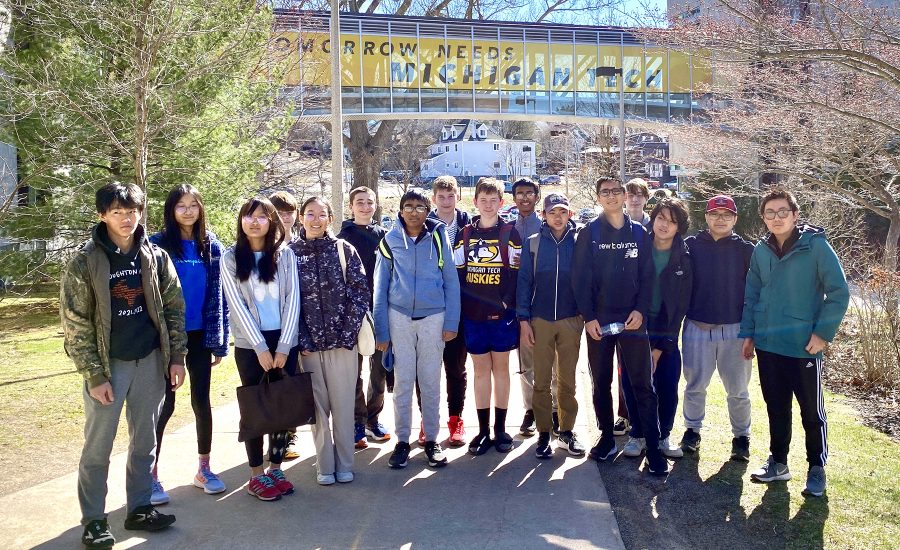
On Saturdays during the academic year, Houghton Middle School and High School students meet up to learn about cybersecurity in CyberHusky, an outreach program organized by College of Computing students and faculty. All local youth who want to learn more about cybersecurity and computers are invited to join the free program. Michigan Tech faculty members Yu Cai (Applied Computing) and Ruihong Zhang (Computer Science) are advisors to the group.
Ninth-grader Gabriel Hjerstedt’s favorite part of CyberHusky is programming in Python and other languages to solve challenging problems. “Dr. Cai and the Michigan Tech students have taught us Linux, Python, and the basics of machine learning,” she says. “We have also written our own machine learning code and discussed some recent breakthroughs in the tech world, such as Sora and Nvidia.“
There are a lot of things tenth grader Anna Wu likes about CyberHusky, too, including learning more about cybersecurity topics and their impact in our world, and competing and having fun. Anna says it’s important to learn about cybersecurity because of how applicable and present it is in our lives.
“With technology continuously advancing, the amount of information—including private information—being stored is increasing at an incredible rate,” Anna says. “We’re putting more and more information out there without giving it the appropriate amount of security and acknowledgement.”
Matthew Baily ‘24 BS in Cybersecurity, volunteered for CyberHusky during his undergraduate studies at Tech. “Working with the CyberHusky students was extremely rewarding. They ask a ton of questions and just want to know everything about everything,” he says. “When you see that something you explained to them actually clicks, it is very enriching. You’re doing something important that is helping someone else.”
Also part of GenCyber, Aston Purdom ’24 BS in Cybersecurity, had the chance to look at cybersecurity from the perspective of an educator. “I reinforced my understanding of cybersecurity by having to break it down into simpler forms to introduce to students.,” he says. “The CyberHusky students aren’t afraid to ask hard questions, so I was made to question my own knowledge.”
The CyberHusky students achieved impressive results in spring 2024 National Cyber League (NCL) individual and team competitions this April. One CyberHusky team ranked #7 nationally among over 600 high school teams from across the nation. Two additional CyberHusky teams ranked #39 and #51 nationally.
In the NCL competitions, college students and high school students tackle the same competition questions but are categorized separately for ranking. CyberHusky scores are on par with those of experienced students from Michigan Tech’s College of Computing and other college students.
Competing in cybersecurity events with friends is what ninth-grader Samual Cai likes best about CyberHusky. “Dr. Cai and the students at Tech help us learn more about cybersecurity during weekly meetings,” he says. “The Tech students have experience with the same events that we compete in, and they provide valuable tips.”
Tenth-grader Anna Wu agrees. “Dr. Cai and the Tech students provide a lot of resources for us,” she says. “We have weekly, 90-minute training sessions and they prepare us well for competitions by teaching us relevant and comprehensive information and sharing knowledge that can be used outside of competition, as well.”
“Cybersecurity has a lot of areas to specialize in and it’s cool that students who specialize in different things come together and use their knowledge to solve problems,” says tenth grader Joshua You. “The NCL challenges include many types of questions, such as web application exploitation, open-source intelligence, and decryption.”
Joshua says that competition questions look something like this: ‘This online store has been hidden by the owner. Find out the price of their donuts?’ or ‘Decrypt this text.’ He notes that he specializes in the web application exploitation questions like the first one.
Anna Wu says that in the individual cybersecurity competitions, it’s a bit more difficult to solve the tougher problems on your own. In the team round, however, “dividing and conquering allows each person to work on what they’re good at.” Anna usually focuses on log analysis during the team competitions.
In addition to this April’s NCL competition, the CyberHusky students have finished strong in other national and state cybersecurity competitions. Read about more CyberHusky accomplishments on the College of Computing news blog.